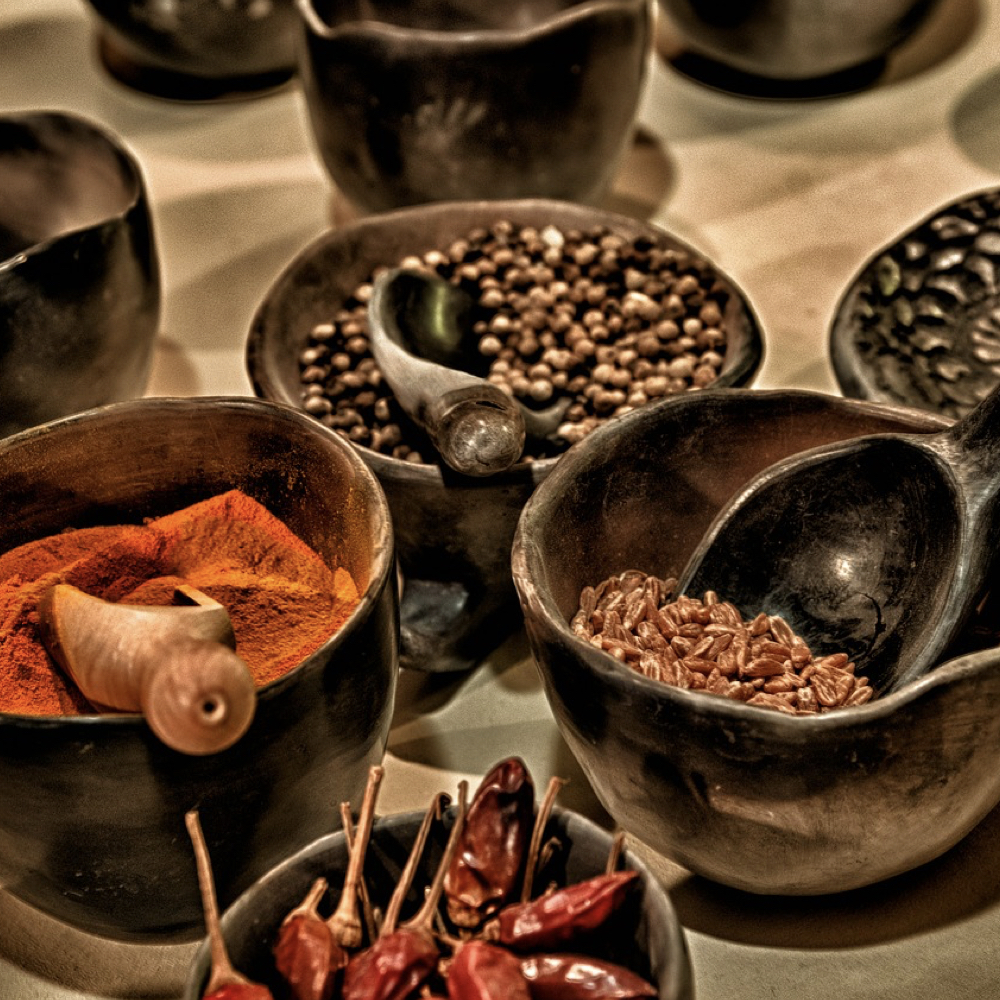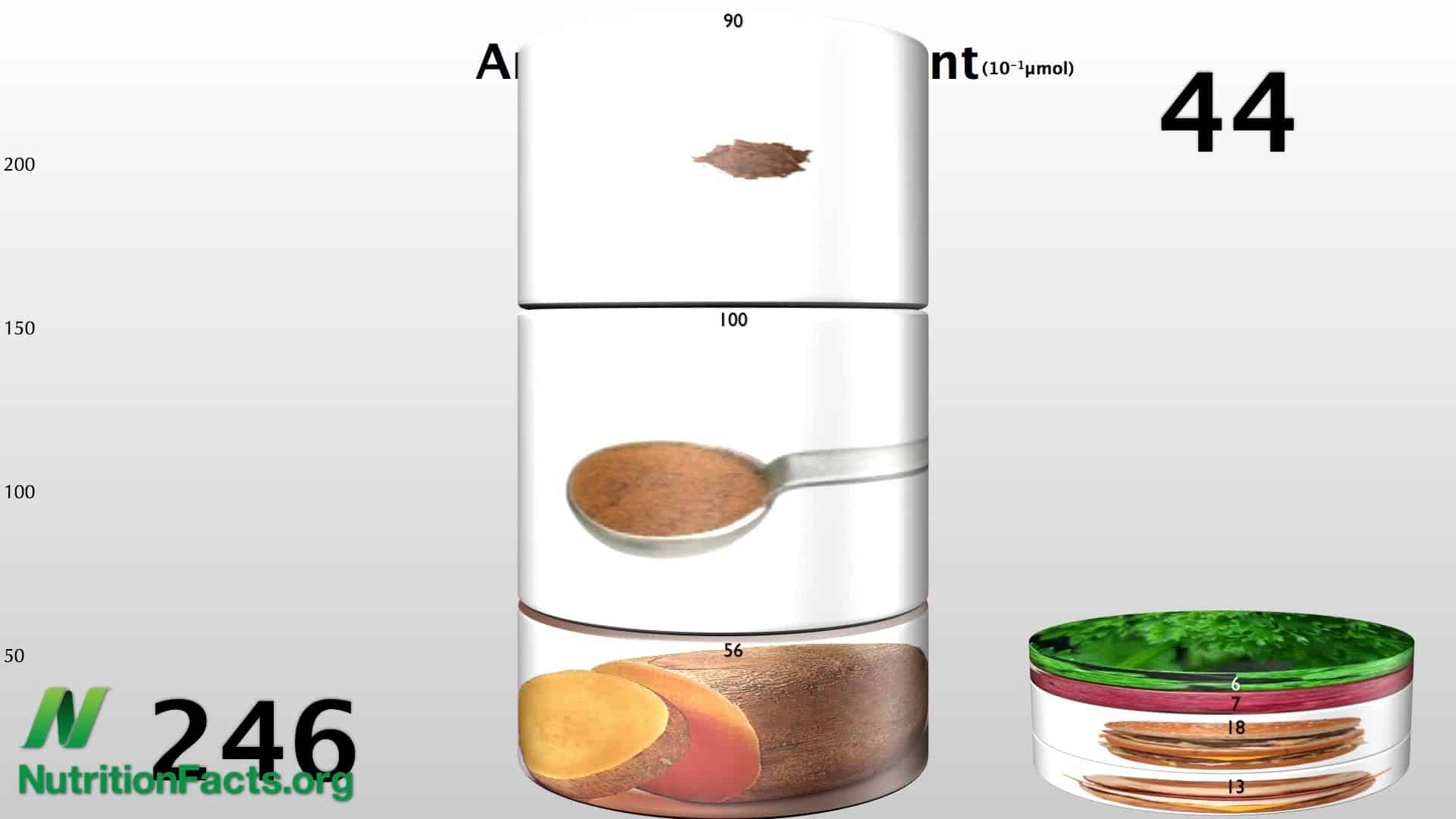
Spices
Spices are the most potent DNA protectors. Just one week of eating about two teaspoons of rosemary or sage a day, one and a half teaspoons of ground ginger or cumin, three-fourths of a teaspoon of paprika, or even just a tenth of a teaspoon of cooked turmeric can protect against breakage of our strands of DNA. A daily quarter teaspoon of amla—dried Indian gooseberry powder—was also found to decrease oxidative DNA damage. This is to be expected, as ounce for ounce, dried herbs and spices pack the greatest antioxidant punch.
Herbs and spices max out at ten times the antioxidant power of nuts and seeds, for example. Of course, it’s easier to eat an ounce of nuts than it is to eat an ounce of nutmeg, but some herbs and spices are so off-the-charts that even just a small pinch can go a long way. For example, adding a single teaspoon of dried oregano to a bowl of whole-wheat spaghetti with marinara and steamed broccoli nearly doubles the antioxidant power of the dish. Even just two-thirds of a teaspoon of marjoram would offer the same boost. A half teaspoon of cinnamon more than quintuples the antioxidant content of a bowl of oatmeal, and we have verification of bioavailability. A dozen randomized controlled trials have shown that cinnamon—both cassia and Ceylon varieties—can increase the antioxidant capacity of our bloodstream and reduce free radical damage at doses ranging from just half a teaspoon to one and a half teaspoons a day.
My Daily Dozen recommends at least a quarter teaspoon of the spice turmeric every day, along with any other (salt-free) herbs and spices you may enjoy.
For substantiation of any statements of fact from the peer-reviewed medical literature, please see the associated videos below.
Image Credit: Pixabay. This image has been modified.
Popular Videos for Spices

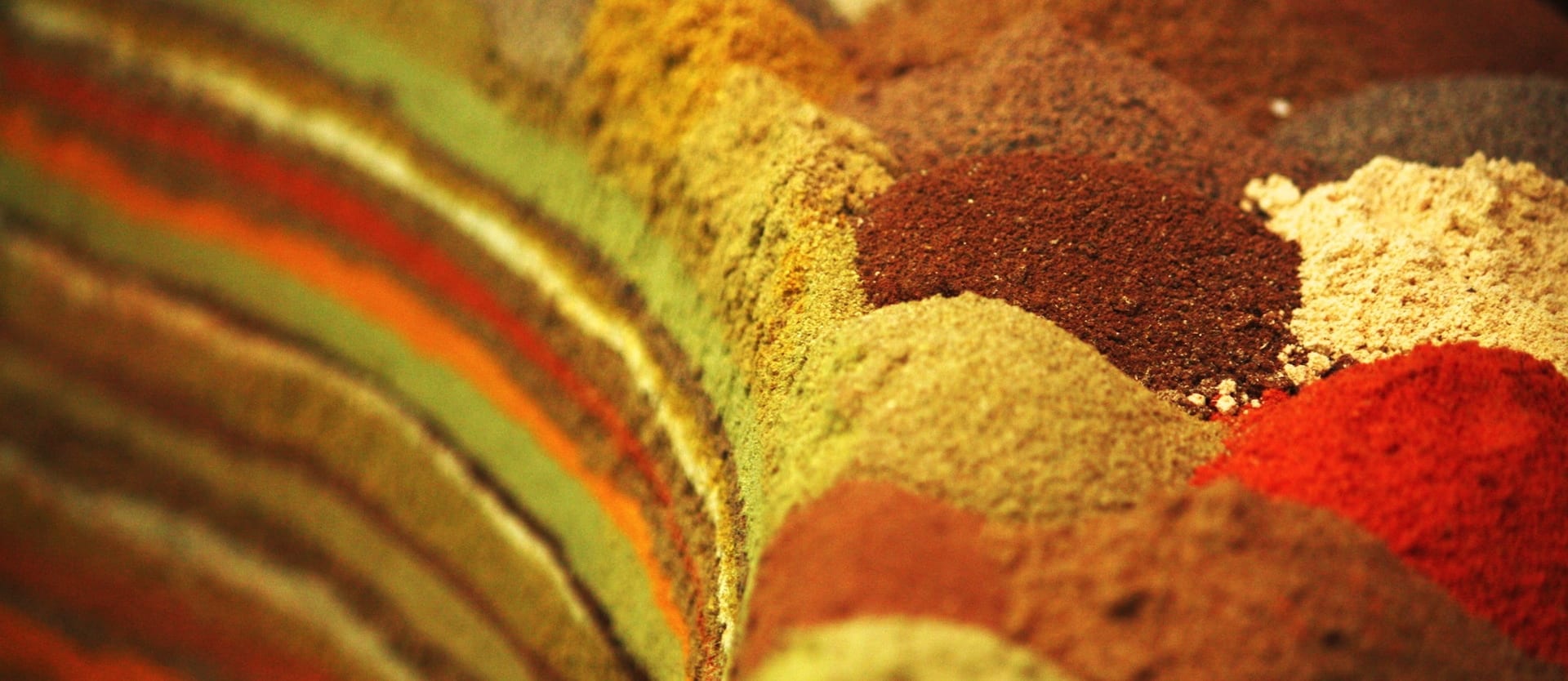
Which Spices Fight Inflammation?
An elegant experiment is described in which the blood of those eating different types of...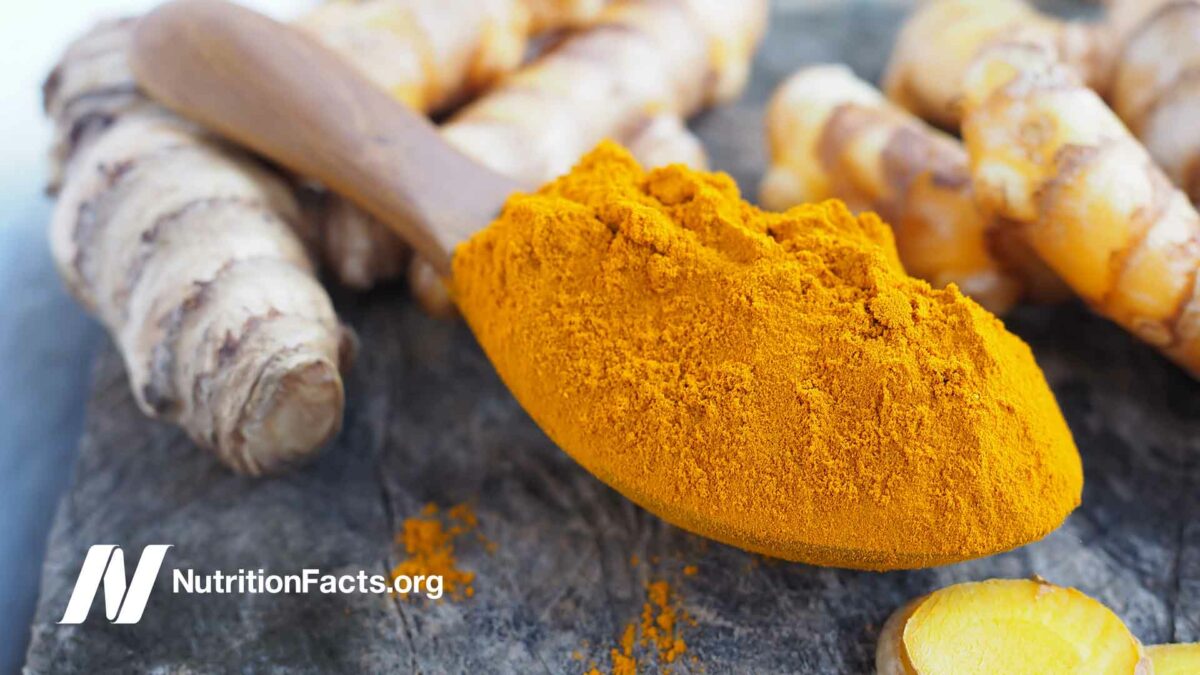
Back to Our Roots: Curry and Cancer
Dramatically lower cancer rates in India may in part be attributable to their more plant-based,...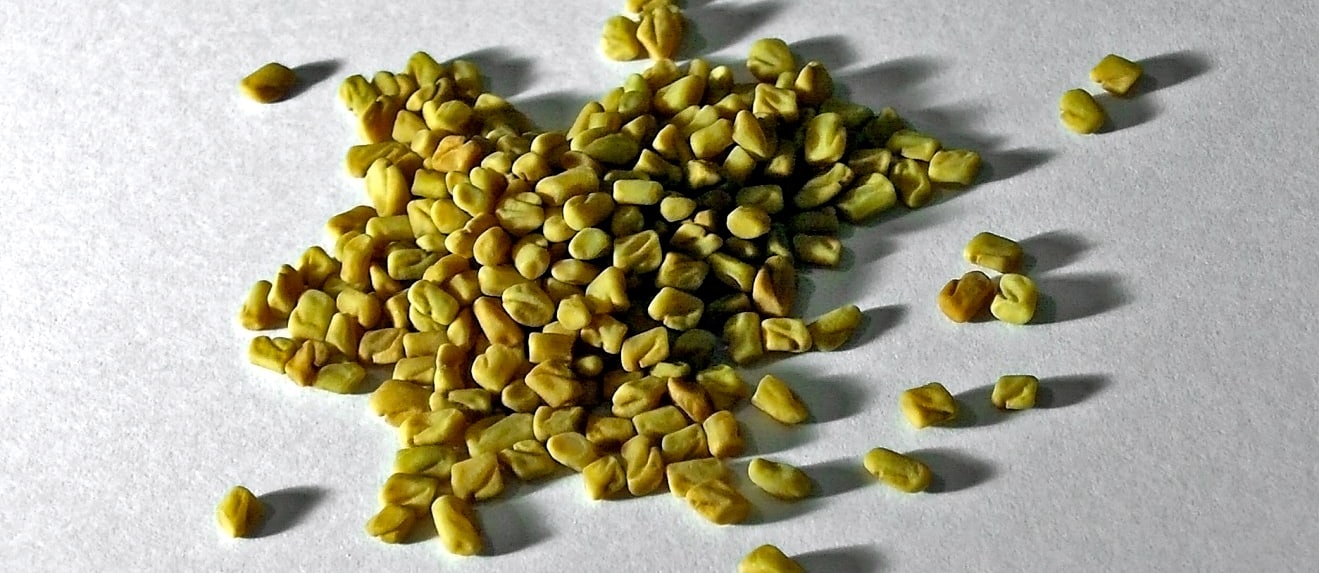
Benefits of Fenugreek Seeds
The spice fenugreek appears to significantly improve muscle strength and weightlifting power output, while possessing...
Carcinogen-Blocking Effects of Turmeric
Less than a teaspoon a day of turmeric appears to significantly lower the DNA-mutating ability...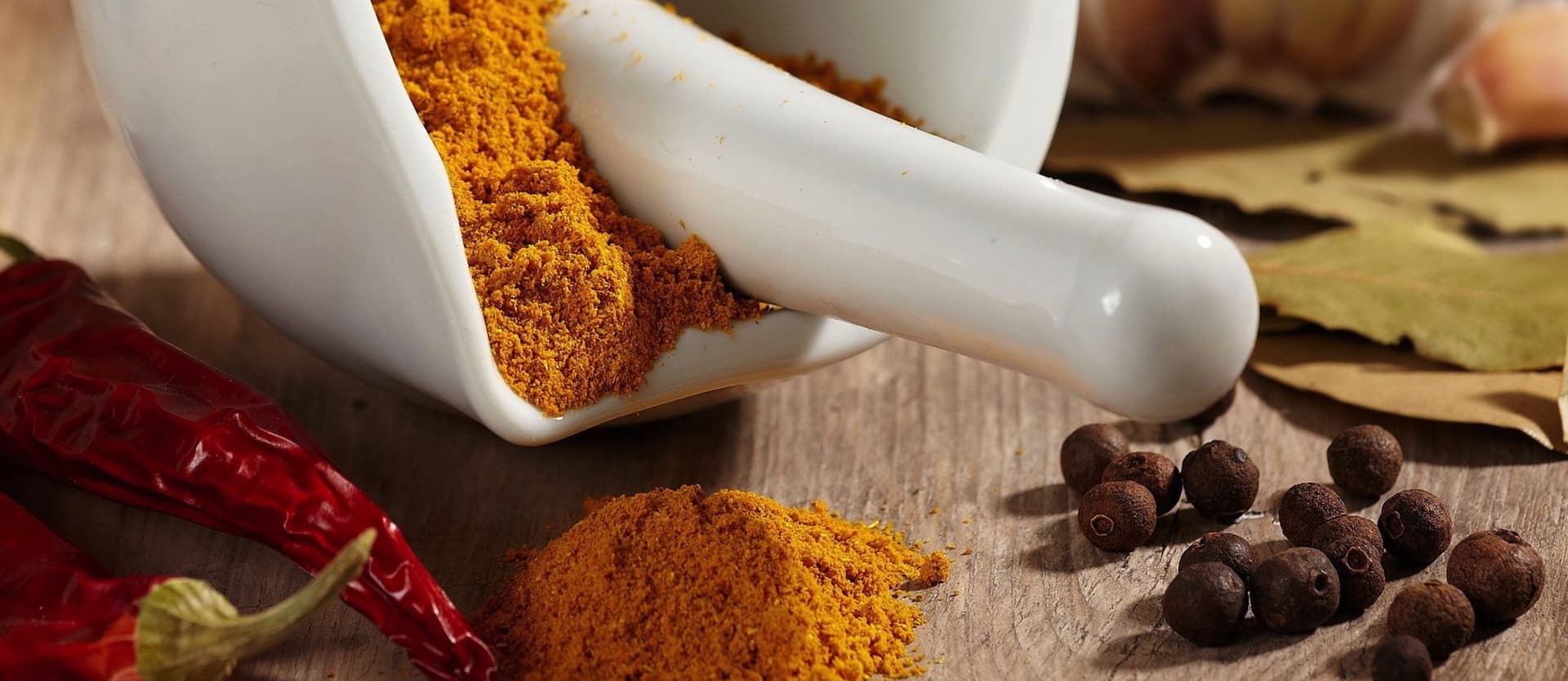
Boosting the Bioavailability of Curcumin
Dietary strategies, including the use of black pepper (piperine), can boost blood levels of curcumin...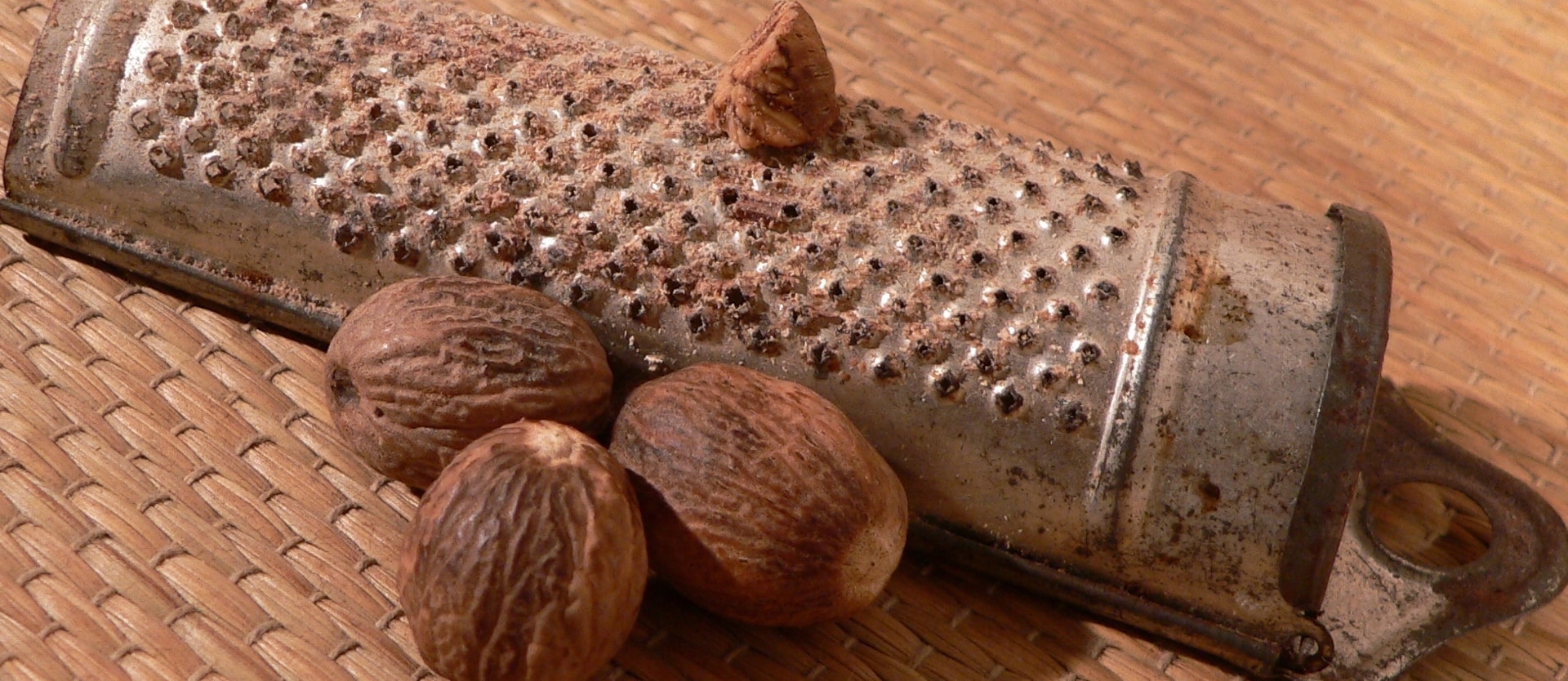
Don’t Eat Too Much Nutmeg
The spice nutmeg may have a relatively narrow margin of safety.
Ground Ginger to Reduce Muscle Pain
There have been at least eight randomized, double-blind, placebo-controlled trials of ginger for pain.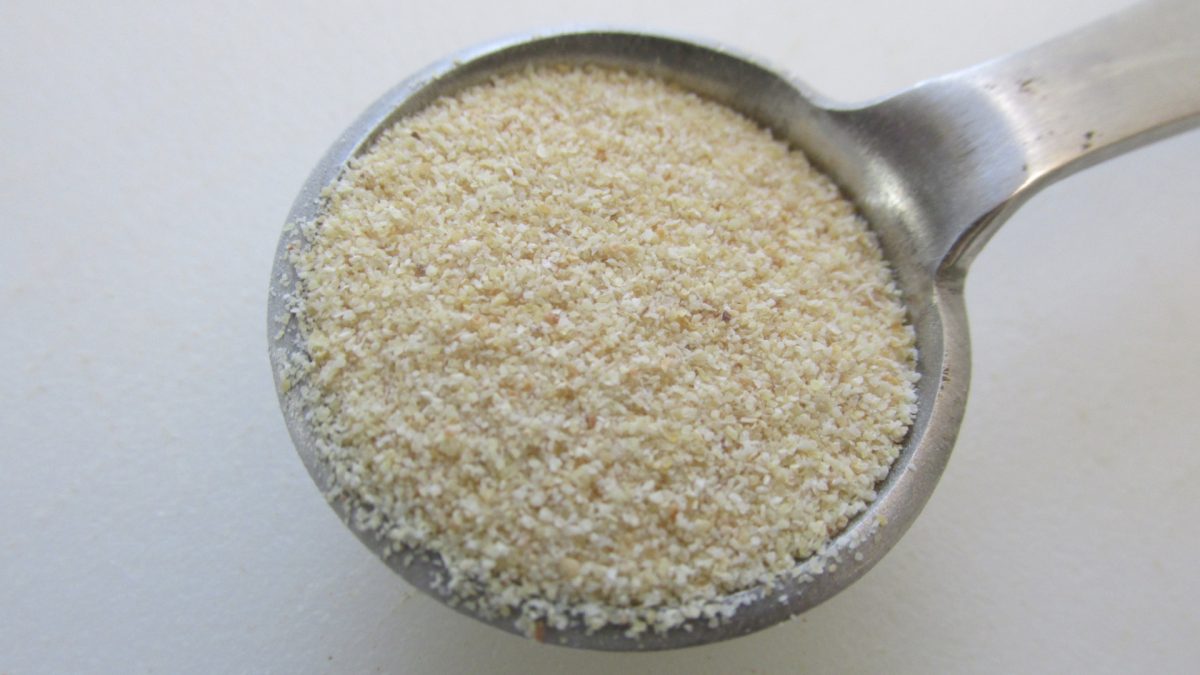
Benefits of Garlic Powder for Heart Disease
See what a penny a day worth of garlic powder can do.All Videos for Spices
-

Natural Ozempic Alternatives: Boosting GLP-1 with Diet and Lifestyle
Certain spices and the quinine in tonic water can boost GLP-1, but at what cost?
-

3 Healthy, Easy Recipes: Appetizer, Pasta, and Dessert
Celebrate the season with recipes from my cookbooks.
-

How Not To Age – Live Presentation
In this live lecture, Dr. Greger offers a sneak peek into his latest book, How Not to Age, a New York Times Best Seller.
-

Targeting Angiogenesis to Lose Weight
Expanding body fat releases blood supply-generating factors that may end up hooking up tumors, too.
-

How Hot Peppers May Extend Your Life
Spice can hack your brain by making foods taste saltier.
-

Is Spicy Food Good for You?
Those who eat spicy foods regularly tend to live longer, but is it cause-and-effect?
-

Does Coffee Inhibit Iron Absorption? What Are the Effects of Having Too Much Iron?
Coffee and common herbal teas impair iron absorption, which may help explain some of their benefits.
-

Dr. Greger in the Kitchen: Groatnola
Dr. Greger whips up another of his go-to breakfast meals.
-

The Best Diet for Fibromyalgia and Other Chronic Pain Relief
Anti-inflammatory diets can be effective in alleviating chronic pain syndromes.
-

The Benefits of Fenugreek for Preventing and Treating Diabetes
The spice fenugreek contains 4-hydroxyisoleucine, a peculiar amino acid that may explain its benefits for controlling blood sugar.
-

Blocking the Cancer Metastasis Enzyme MMP-9 with Beans and Chickpeas
Which legumes are best at inhibiting the matrix metalloproteinase enzymes that allow cancer to become invasive?
-

Which Foods Are Anti-Inflammatory?
Foods that reduce inflammation. What does an anti-inflammatory diet look like?
-

Ochratoxin in Certain Herbs, Spices, and Wine
Most food crops are contaminated with fungal mycotoxins, but some foods are worse than others.
-

Fasting for Irritable Bowel Syndrome
More than half of IBS sufferers appear to have a form of atypical food allergy.
-

Benefits of Cumin and Saffron for Weight Loss
The spice cumin can work as well as orlistat, the “anal leakage” obesity drug.
-

Exploiting Sensory-Specific Satiety for Weight Loss
How can we use sensory-specific satiety to our advantage?
-

Benefits of Black Cumin Seed (Nigella Sativa) for Weight Loss
For three cents a day, black cumin may improve cholesterol and triglyceride levels, blood pressure, and blood sugar control, as well as accelerate the loss of body fat.
-

The Benefits of Millet for Diabetes
What were the remarkable results of a crossover study randomizing hundreds of people with diabetes to one and a third cup of millet every day?
-

Benefits of Garlic Powder for Heart Disease
See what a penny a day worth of garlic powder can do.
-

Trailer for How Not to Diet: Dr. Greger’s Guide to Weight Loss
17 ingredients to an ideal weight-loss diet and the 21 tweaks to accelerate the further loss of excess body fat.
-

Evidence-Based Weight Loss – Live Presentation
In this live presentation, Dr. Greger offers a sneak peek into his book How Not to Diet.
-

Recipe: Veggie Mac & Cheese
A cruciferous spin on macaroni and cheese, this recipe takes comfort food to a whole new level, and is a tasty way to check off a few servings on the Daily Dozen checklist. This recipe comes from Kristina, our Social Media Director.
-

Recipe: Easy Veggie Tacos
This recipe for Veggie Tacos comes from staff member Ángela.
-

Is Ginger Beneficial in a Diabetic Diet?
Ground ginger and ginger tea are put to the test for blood sugar control.
-

Pros and Cons of a Macrobiotic Diet
What happens when you put diabetics on a diet composed of largely whole grains, vegetables, and beans?
-

Dr. Greger’s Daily Dozen Checklist
In my book How Not to Die, I center my recommendations around a Daily Dozen checklist of everything I try to fit into my daily routine.
-

Saffron vs. Memantine (Namenda) for Alzheimer’s
The spice saffron is pitted head-to-head against the leading drug for severe Alzheimer’s disease.
-

The Best Food for Fibroids
Women with uterine fibroids should consider adding green tea to their daily diet, as a randomized, double-blind, placebo-controlled interventional trial suggests it may help as well as surgery.
-

Benefits of Turmeric for Arsenic Exposure
What happened when turmeric curcumin was put to the test to see if it could reverse DNA damage caused by arsenic exposure?
-

Dr. Greger’s Daily Dozen Checklist
In my book How Not to Die, I center my recommendations around a Daily Dozen checklist of all the things I try to fit into my daily routine.
-

The Benefits of Açai vs. Blueberries for Artery Function
What are the effects of açai berries, cooked and raw blueberries, grapes, cocoa, green tea, and freshly squeezed orange juice on artery function?
-

Best Food for Antidepressant-Induced Sexual Dysfunction
The spice saffron may not only work as well as SSRI antidepressant drugs like Prozac, Paxil, and Zoloft without the side effects, but it may even be able to treat the adverse sexual side effects that occur in up to 70 percent of people taking the drugs.
-

Best Foods for Lead Poisoning: Chlorella, Cilantro, Tomatoes, Moringa?
All plants produce “phytochelatins” to bind up heavy metals to protect themselves from the harmful effects, so what if we ate the plants?
-

Best Supplements for Prostate Cancer
What would happen if you secretly gave cancer patients four of the healthiest foods?
-

Benefits of Rosemary for Brain Function
A half teaspoon of dried rosemary can improve cognitive function.
-

Benefits of Ginger for Menstrual Cramps
An eighth of a teaspoon of ground ginger power is tested head-to-head against the leading drug for the alleviation of painful periods.
-

Best Foods for Polycystic Ovary Syndrome (PCOS)
Which foods and cooking methods should we choose and avoid, given the role advanced glycation end products (glycotoxins) may play in polycystic ovary syndrome (PCOS)?
-

Benefits of Marjoram for Polycystic Ovary Syndrome (PCOS)
Even a small amount of fresh herbs can double or even quadruple the antioxidant power of a meal. The abilities of oregano to decrease chromosomal damage from radiation and marjoram to affect hormone levels in women with PCOS are put to the test.
-

Plants with Aspirin Aspirations
Should the active ingredient in aspirin be considered an essential vitamin?
-

Ginger for Osteoarthritis
A quarter- to a half-teaspoon a day of powdered ginger can be as pain-relieving as ibuprofen, without the risk of damage to the intestinal lining.
